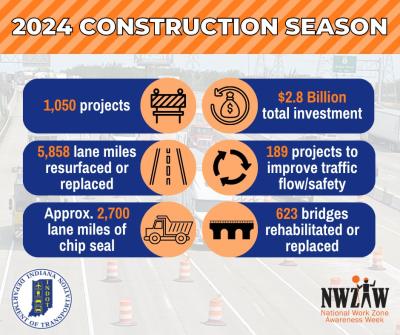Last December, workers repaving and repairing Interstate 295 had to take a winter break. The paving material that is being used, stone matrix asphalt, requires warm weather in order to be successfully laid and to result in a quality product. Since April, crews have returned to finish up the contracts.
The Commonwealth Transportation Board approved two contracts for repaving work on Interstate 295 deemed critically in need of repair. The contracts were awarded to Lee Hy Paving Corporation and Branscome Companies and will cover approximately 11 mi. (17.7 km) of I-295 North, providing the worn highway with pavements repairs and roadway improvements.
Work consists of concrete repair, pavement overlay, guardrail upgrades and pavement marker installation. The contractors have subcontracted out parts of the project, including guardrail, underdrain, striping and milling work.
Both contracts involve a pavement overlay process using stone matrix asphalt (SMA), which is a material that can only be applied during warm temperatures to ensure the product’s quality. Concrete repair was performed before this overlay process. All improved sections will consist of 4-in. (10.2 cm) of intermediate course and 1.5 in. (3.8 cm) of SMA. This combination will extend the life of the highway. Furthermore, the improvements will make the I-295 corridor safer and smoother for travelers.
Work resumed in April once temperatures became consistently warmer.
“The project had shut down for the winter,” stated Justin Sayko, construction manager of the Northern Region of the Virginia Department of Transportation (VDOT).
“They didn’t continue paving because of the material,” Sayko explained. “When it gets cold, it becomes stiff.”
The first contract, worth $11 million and awarded to Lee Hy Paving Corporation in Glen Allen, Va., includes improvements to two areas along I-295 North. One of the sections to be improved is located in Hanover County, from Pole Green Road/Exit 38 to the Chickahominy River at mile marker 42. This entire section was completed last year, except for the rumble strip installation, which was completed in May.
Lee Hy Paving’s other section is in Henrico County, from Greenwood Road/Exit 45 to the Route 33 interchange at Staples Mill Road/Exit 49. Much of the paving for this section was completed last year. Ahead of schedule, Lee Hy Paving still needs to complete the SMA placement, rumble strips and final striping. The contractor expects to complete the rest of the work by August.
Branscome Companies was awarded a contract worth $4.2 million. Its job also is separated into two sections, and one has been completed early. The completed contract consisted of work that occurred on I-295 North, starting near the Chickahominy River up to the Greenwood Road overpass — approximately 2 mi. (3.2 km). The project consisted of pavement repairs to the lanes along the I-295 North collector-distributor road, I-95 South interchange, and Route 1 North and South interchange.
The other section that Branscome is working on is in Henrico County on I-295 North between Route 33 interchange at Staples Mill Road/Exit 49 to just south of Nuckols Road (mile marker 52). Sayko confirmed that the contractor has just started patching in this section.
Both companies’ contracts were initially scheduled to be completed by August, but much of the work has been completed faster than expected. When asked if the region’s unseasonably warm weather at the end of last year helped speed up things, Sayko said, “Of course.”
Lee Hy Paving and Branscome are using similar methods and equipment on their respective contracts.
“Shuttle Buggies are being utilized in conjunction with the asphalt pavers to prevent segregation of the mix and maintain material temperature,” Sayko explained.
Since the Shuttle Buggy has storage capacity, it receives the asphalt mix from trucks and feeds the paver at a uniform rate allowing the paving operation to become a continuous operation. Sayko described the Shuttle Buggy as “essentially … an oversized, enclosed truck transfer vehicle.”
Additionally, ABG dual tamping bar pavers are being used by the contractors to place the SMA.
“A tamping bar is a strike off plate, which produces a smooth, semi-compacted mat behind the paver,” explained Sayko.
A dual tamping bar hits a freshly placed mat twice, providing a more compacted mat — 90.1 percent compaction to be exact — than typical pavers. As a result, said Sayko, “The better the compaction behind the paver, the better the final ride.”
The ABG pavers being used on the I-295 repaving project also use what Sayko describes as “a mobile mat referencing system, which helps control the depth of the paver.”
The system reads any depressions or grade changes in the road and the depth of the mix being placed; it then averages the difference between the two, which allows the operator to adjust the paving depth to provide a road with a smoother ride.
Interstate 295 was built in stages with the oldest section completed in 1980 and the most recent section completed in 1995. The parts of I-295 presently experiencing the majority of pavement failure are the oldest sections.
Increased traffic volume over the years has contributed to the highway’s deterioration. VDOT estimates there has been a 15 to 20 percent increase in traffic in the last four years, which translates to roughly 9,000 cars per day.
Another factor for the deteriorating state of some sections is that concrete was used in the construction of the riding surface. Even though concrete is a durable material and has a longer service life than asphalt, VDOT believes that once concrete begins its natural deterioration process, it becomes rough and more difficult and costly to repair.
Starting in Spring 2009, repairs and paving will occur on three additional sections of I-295 in Hanover and Henrico counties. Contracts for these sections have not yet been awarded. CEG
Today's top stories














